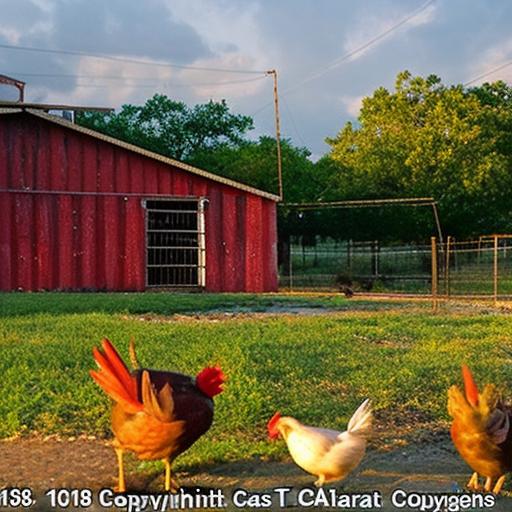Keeping hogs and chickens as pets or for farming purposes can be a rewarding experience. However, it is important to follow regulations and guidelines to ensure the welfare of the animals and the community. This article will provide an overview of the requirements for keeping hogs and chickens, including housing requirements, permits, and regulations for slaughtering and selling meat or eggs.
Key Takeaways
- Keeping hogs and chickens requires compliance with general provisions and specific requirements.
- Housing requirements for chickens and hogs differ and must be met for the animals’ health and safety.
- Chicken coops must be designed and constructed properly, located appropriately, and maintained and cleaned regularly.
- Failure to comply with regulations may result in penalties and enforcement measures.
- Understanding and following regulations is crucial for responsible and successful hog and chicken keeping.
Definition of Terms
Before diving into the specifics, it is important to define some key terms. A hog is a domesticated pig, typically raised for meat production. A chicken is a domesticated bird, often raised for meat or egg production. A coop is a structure used to house chickens, while a pen is an enclosed area used to house hogs.
There is a difference between keeping hogs and chickens as pets versus for farming purposes. When kept as pets, hogs and chickens are typically housed in smaller enclosures and may have different requirements for food and shelter. When kept for farming purposes, larger enclosures are needed to accommodate a larger number of animals.
Keeping Hogs and Chickens: General Provisions
Before keeping hogs or chickens, it is important to check with local authorities to obtain any necessary permits and comply with zoning laws. These regulations are in place to ensure that the animals are kept in appropriate conditions and do not pose a nuisance to neighbors.
In addition to obtaining permits, it is important to provide adequate food, water, and shelter for the animals. Hogs and chickens have specific dietary needs that must be met in order for them to thrive. It is also important to provide them with appropriate shelter that protects them from the elements and provides a safe and comfortable environment.
Keeping Hogs and Chickens: Specific Requirements
There are specific requirements for keeping hogs and chickens that must be followed. These regulations may vary depending on the location, so it is important to check with local authorities for the specific requirements in your area.
For example, there may be a maximum number of animals allowed per household. This is to ensure that the animals are kept in appropriate conditions and do not become overcrowded. There may also be regulations for slaughtering and selling meat or eggs, including requirements for inspections and certifications.
Housing Requirements for Chickens
When it comes to housing chickens, there are several requirements that must be met. The minimum size of the coop will depend on the number of chickens being housed, but generally, each chicken should have at least 4 square feet of space. The coop should also have proper ventilation and insulation to keep the chickens comfortable in all weather conditions.
It is important to provide nesting boxes for the chickens to lay their eggs. These boxes should be filled with clean bedding material and placed in a quiet and secluded area of the coop. Additionally, perches should be provided for the chickens to roost on at night.
Housing Requirements for Hogs

Hogs have different housing requirements than chickens. The minimum size of the pen will depend on the size of the hogs being housed, but generally, each hog should have at least 50 square feet of space. The pen should also have shade and bedding to keep the hogs comfortable.
Waste management and disposal is an important consideration when housing hogs. Regulations may require that waste be properly contained and disposed of to prevent contamination of water sources and minimize odors. This may involve using a waste management system or regularly cleaning and maintaining the pen.
Chicken Coop: Design and Construction
When designing and constructing a chicken coop, there are several factors to consider. It is important to use sturdy materials that can withstand the elements and protect the chickens from predators. The coop should also be easy to access for cleaning and maintenance.
Predator-proofing the coop is essential to keep the chickens safe. This may involve using wire mesh or fencing to prevent predators from gaining access to the coop. Additionally, the coop should have a secure door that can be locked at night to keep the chickens safe from nocturnal predators.
Chicken Coop: Location and Placement
The location and placement of a chicken coop is important for the health and well-being of the chickens. It is ideal to choose a well-drained area that does not flood easily. The coop should also have access to sunlight and shade throughout the day.
Regulations may also dictate setbacks and distance from neighboring properties. This is to ensure that the coop does not create a nuisance for neighbors and that there is adequate space for the chickens to roam without encroaching on neighboring properties.
Maintenance and Cleaning of Chicken Coop
Regular maintenance and cleaning of a chicken coop is essential for the health and well-being of the chickens. Waste should be regularly removed from the coop and replaced with clean bedding material. This helps to prevent the buildup of ammonia and bacteria, which can lead to respiratory issues and other health problems for the chickens.
It is also important to regularly disinfect the coop to prevent the spread of diseases. This can be done using a mild bleach solution or other disinfectant recommended by a veterinarian. Regular cleaning and disinfection will help to keep the chickens healthy and prevent the spread of diseases within the flock.
Penalties and Enforcement Measures
Violating regulations and guidelines for keeping hogs and chickens can result in penalties. These penalties may include fines, loss of permits, or even legal action. Local authorities often have enforcement measures in place to ensure compliance with regulations, such as routine inspections or responding to complaints from neighbors.
It is important to take these regulations seriously and follow them to avoid penalties and maintain good relationships with neighbors. By following regulations and guidelines, you can ensure that your hogs and chickens are kept in appropriate conditions and contribute positively to your community.
Keeping hogs and chickens can be a rewarding experience, whether as pets or for farming purposes. However, it is important to follow regulations and guidelines to ensure the welfare of the animals and the community. By obtaining permits, providing adequate food and shelter, and following specific requirements for housing and maintenance, you can keep your hogs and chickens happy and healthy. Remember to check with local authorities for the specific regulations in your area and seek further information and resources to ensure you are meeting all requirements.
If you’re interested in learning more about keeping hogs and chickens, you might find this article on Poultry Wizard quite informative. It discusses the mating season for turkeys and provides valuable insights into breeding practices. Additionally, if you’re curious about how many eggs geese lay, another article on the same website explores this topic in detail. Lastly, if you’re looking for tips on building a chicken coop, this article specifically focuses on a chicken coop in Chester, SC. Check out these resources to expand your knowledge on raising hogs and chickens.
FAQs
What is the Austin Municipal Code?
The Austin Municipal Code is a set of laws and regulations that govern various aspects of life in the city of Austin, Texas.
What does the Austin Municipal Code say about keeping hogs and chickens?
The Austin Municipal Code allows residents to keep hogs and chickens on their property, but there are certain rules and regulations that must be followed.
What are the rules for keeping hogs in Austin?
Residents are allowed to keep up to two hogs on their property, but the hogs must be kept in a secure enclosure that is at least 150 feet from any neighboring residence or business. The enclosure must also be kept clean and free of any offensive odors.
What are the rules for keeping chickens in Austin?
Residents are allowed to keep up to ten chickens on their property, but the chickens must be kept in a secure enclosure that is at least 50 feet from any neighboring residence or business. The enclosure must also be kept clean and free of any offensive odors. Roosters are not allowed within city limits.
Do I need a permit to keep hogs or chickens in Austin?
No, residents do not need a permit to keep hogs or chickens in Austin, but they must follow the rules and regulations set forth in the Austin Municipal Code.
What happens if I violate the rules for keeping hogs or chickens in Austin?
If you violate the rules for keeping hogs or chickens in Austin, you may be subject to fines or other penalties. It is important to follow the rules and regulations set forth in the Austin Municipal Code to avoid any legal issues.
Meet Walter, the feathered-friend fanatic of Florida! Nestled in the sunshine state, Walter struts through life with his feathered companions, clucking his way to happiness. With a coop that’s fancier than a five-star hotel, he’s the Don Juan of the chicken world. When he’s not teaching his hens to do the cha-cha, you’ll find him in a heated debate with his prized rooster, Sir Clucks-a-Lot. Walter’s poultry passion is no yolk; he’s the sunny-side-up guy you never knew you needed in your flock of friends!







